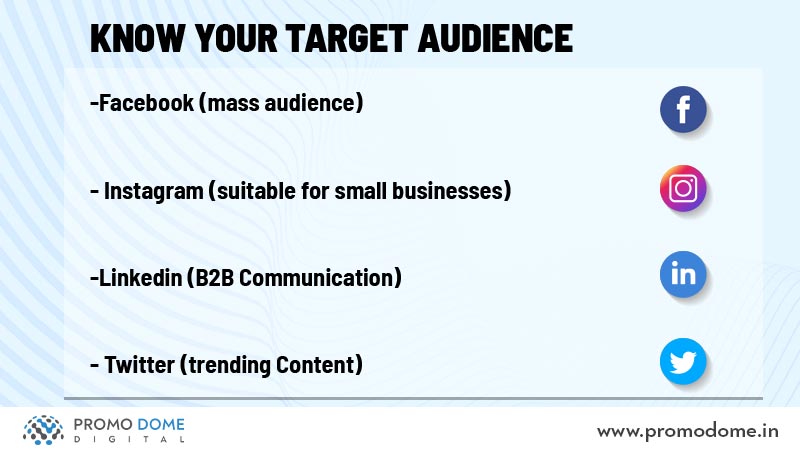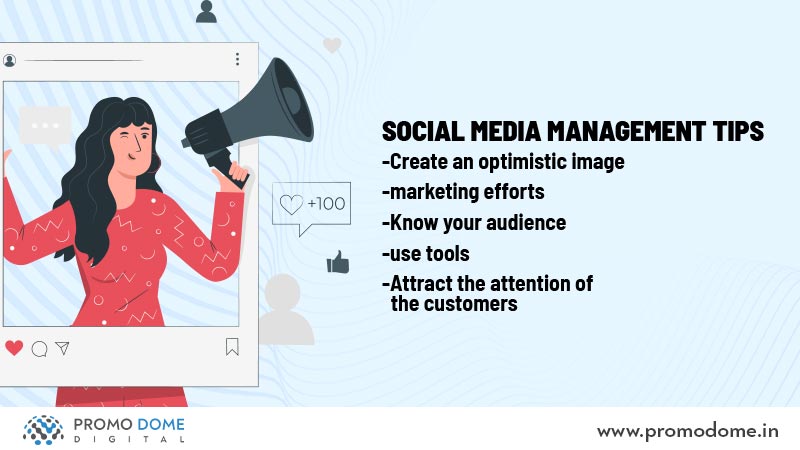If you are a small organisation and want to reach out to potential consumers, then social media management will act as a bridge for you. Social media is a potential platform to build your brand loyalty and connect with customers. Sometimes this can also act as a negative trait, hence you need to build strategies and learn social media management closely.
Table of Contents
Social Media Management Tips
 Create an optimistic image for your company
Create an optimistic image for your company
Social media allows you to bring your brand in front of people considerably more rapidly and easily as compared to traditional media. Furthermore, it encourages your audience to think about your brand even when they aren’t thinking about it! You may do this for your brand by customising messages for each channel to retain brand coherence and visual identity.
In marketing, establishing your brand’s credibility is crucial. It’s important to remember that the number of followers cannot measure your brand’s legitimacy. If you are a small firm then you should start with the correct collection of people rather than hitting the unrelated broad range of viewers.
Utilise your marketing efforts
It would be beneficial if you were not entirely reliant on a single platform or medium, particularly online or offline marketing, to reach your objectives. Instead, it would be great to combine the two channels to get the most out of them. Choose your internet presence wisely and to the best of your ability. Use social media to discuss your brand’s mission and explore relatable tales to have a massive impact on your brand’s reputation.
Know who you want to reach
You must concentrate on and comprehend your target audience – for instance, what are your customers’ interests and desires? This will assist you in determining which social media site to use for engagement and reach. While you’re there, research all of the platforms and then make your decision.
 Facebook is a social media platform that attracts a mass audience.
Facebook is a social media platform that attracts a mass audience.
Instagram is a platform that is most suitable for small businesses
LinkedIn is a professional networking site that promotes B2B Communication
Twitter is a social media platform that supports trending Content the most.
Once you’ve decided which social media platform to use, make sure to cross-promote the content across all of your other marketing channels to ensure that your promotions are successful.
To grow your business, you should use a combination of social media, online advertising, and public relations.
Use tools
You should always have a few tools on hand when starting with social media. There are numerous social media solutions on the internet market that can assist you in succeeding, managing, and being productive on your social media platform. You can employ social media tools for content creation, ORM, scheduling, publishing, analytics, and more to improve your effectiveness. Including these tools in your normal processes will help you increase your overall performance and maintain consistency. Canva, Hootsuite, Creator Studio, and others are among these tools.
Attract the attention of the customers
Attracting the right audience is a crucial stage in marketing. In general, the audience differs from one platform to the next. As a result, it’s critical for local businesses to geo-target their content to a specific audience that lives nearby and is interested in their industry. Keep track of the special offers that bring more visitors to your website. For example, if you inform them they can get 5% off their first purchase or use a unique code from one of your social media sites to get a discount on your website, sales should rise.
Conclusion
Remember that no matter how big or small your company is, this Social Media Management strategy will significantly influence your social media marketing. You can engage better with your audience and raise brand awareness with some good data strategy and social media tools. Start with one or two essential social media channels and gradually expand your marketing efforts. This way, you’ll be able to reach out to the relevant people who can assist you attain your end goal.
Frequently Asked Questions
Q1. What are the best social media tools for small businesses?
Ans. These are some of the tools you need to use:
- Zoho Social
- Hootsuite
- Sprout Social
Q2. What is the best way to manage social media?
Ans. Follow these tips to manage your social media platforms:
- Use tools for scheduling your posts.
- Be consistent.
- Follow trends.
- Learn to recycle content.
- Create daily posts.
- React to controversies.
Q3. Why is social media management critical in business?
Ans. Businesses that have a social media presence are capable of building an online community. Those who like the products are likely to be loyal consumers. Hence this helps social media managers to target and reach potential consumers.
Q4. How do you manage a brand on social media?
Ans. If you want to manage a brand on social media, here are a few things that you need to follow:
- Keep the Social Media Accounts updated
- Share Content Regularly
- Import Your Contacts
- Search & Join Groups
- Maintain the Brand Voice, Image & Tone of your brand

 Create an optimistic image for your company
Create an optimistic image for your company